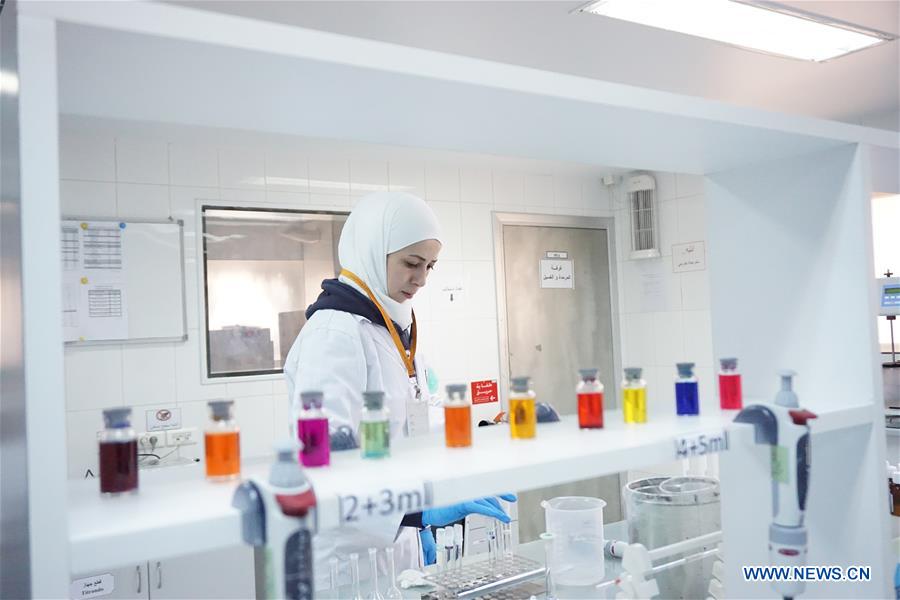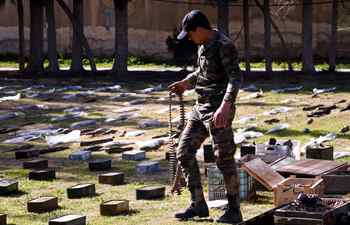 ?
?File photo taken on Dec. 13, 2018 shows a researcher experimenting at a lab of the Diamond Pharma factory in the countryside of Damascus, capital of Syria. Despite long years of war and Western sanctions, the pharmaceutical industry in Syria is recovering, covering 90 percent of domestic demands. Local reports said 5,000 pharmacies and 24 pharmaceutical factories stopped service during the war. But the Health Ministry in Syria kept providing facilitation for the factories that are still operating in order to answer the demand of the people. As the situation in the country has become much better over the past year, the number of authorized pharmaceutical factories reached 8,977, which now have a capacity to cover the local market, Habib Abboud, deputy health minister for pharmaceutical affairs, told Xinhua. (Xinhua/Wang Jian)
DAMASCUS, Jan. 28 (Xinhua) -- Despite long years of war and Western sanctions, the pharmaceutical industry in Syria is recovering, covering 90 percent of domestic demands.
During the more than seven-year war, many pharmaceutical factories in Syria have gone out of service mainly because of the presence of rebels in key areas, such as the countryside of the capital Damascus and the northern city of Aleppo, where many factories are located.
Local reports said 5,000 pharmacies and 24 pharmaceutical factories stopped service during the war.
But the Health Ministry in Syria kept providing facilitation for the factories that are still operating in order to answer the demand of the people.
As the situation in the country has become much better over the past year, the number of authorized pharmaceutical factories reached 8,977, which now have a capacity to cover the local market, Habib Abboud, deputy health minister for pharmaceutical affairs, told Xinhua.
"The factories have returned to its pre-war production capacity which is now covering over 90 percent of the local needs in Syria," Abboud said.
According to the Syrian official, the sanctions Western countries imposed on his country involved the pharmaceutical industry in terms of exporting raw materials to Syria, which should not have happened because the sector is purely humanitarian.
"There are difficulties without doubt. Despite the fact that this is medicine and it should be away from any sanctions, many countries have imposed sanctions and restrictions on Syria," he lamented.
Syria suffers from lack of some kinds of medicine as some countries have prevented their factories from exporting medicine to the war-torn country, Abboud explained.
"We don't have direct links with the West and thus the raw materials are brought in from neighboring countries such as Lebanon and in this case, the production costs have become higher," he added.
At the Diamond Pharma factory, which is located in the countryside of Damascus near an area that was once controlled by the rebels, production work is going smoothly in the labs.
Workers in the lab said their working hours were short then because they could not leave the area at night over security concerns.
Additionally, the transport of medicine in and out of the factory was not an easy task when the area was controlled by the rebels.
However, since the Syrian army fully re-captured the countryside of Damascus in May 2018, the situation has become much better with security concerns all gone.
The staff can now keep working for long hours in the night, while the factory itself is applying for permission to produce new types of medicine.
Jamil Khamassmieh, a supervising pharmacist at the Diamond Pharma, said the war has affected the production of medicine and thus the availability of certain kinds in the market.
But with improved security, the production has gradually returned to normal, he noted.
"We are now able to respond to the market demands by offering enough medicine and making new types of medicine," Khamassmieh said.















